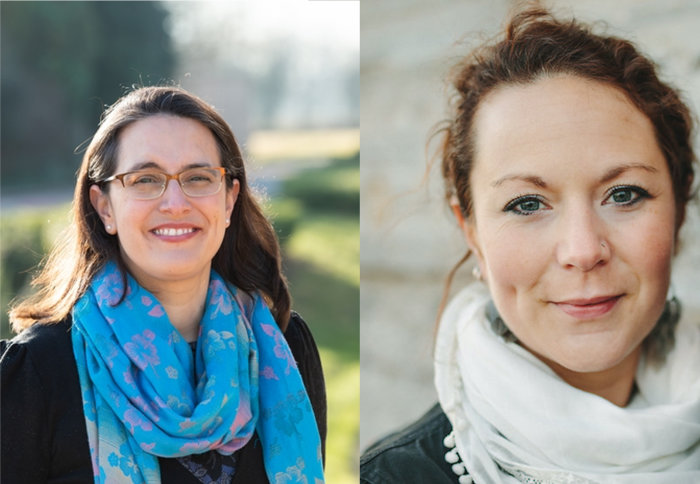UKRI awards two Imperial researchers Future Leaders Fellowships

Dr Natalie Shenker and Dr Michelle Percharde are part of a new generation of rising stars that will tackle pressing global challenges.
Dr Shenker and Dr Percharde are two of the first wave of 41 researchers awarded UK Research and Innovation (UKRI) Future Leaders Fellowships, supported by a £900 million investment fund. The scheme provides researchers and innovators from diverse backgrounds and career paths with the flexibility and time they need to make progress on truly challenging questions.
Professor Jonathan Weber, Dean of Imperial’s Faculty of Medicine, said: "I congratulate Natalie and Michelle on their prestigious Fellowships. This is the first-ever round of this new award, which aims to identify the most promising young scientists in the UK from across all disciplines, and give them stable, long-term funding, allowing them to develop into independent investigators. I greatly look forward to following their progress at Imperial."
Dr Natalie Shenker – Department of Surgery and Cancer
 The overall goal of Dr Shenker’s Fellowship is to lay the foundations for a diverse range of studies that aim to understand milk variability between mothers, over the course of feeding babies and toddlers. It will start to map out how milk bank services in the UK can support mothers to breastfeed most effectively.
The overall goal of Dr Shenker’s Fellowship is to lay the foundations for a diverse range of studies that aim to understand milk variability between mothers, over the course of feeding babies and toddlers. It will start to map out how milk bank services in the UK can support mothers to breastfeed most effectively.
This work will crucially create a large bioresource of human milk samples from thousands of mothers to enable a wide-ranging programme of research into breastmilk constituents, infant health in the short and long-term, and the impact on maternal health during lactation and in later life.
Natalie said: “This Fellowship is a unique opportunity to start a much-needed programme of collaborative research with support for mothers at its core. I am passionate about enabling both women and men to understand more about one of our most fundamental abilities – nourishing the next generation.”
Dr Michelle Percharde – MRC London Institute of Medical Sciences
 The Fellowship has brought Dr Percharde back to the UK from the USA, where she held a Postdoctoral Fellowship funded by the California Institute of Regenerative Medicine at the University of California San Francisco with Professor Miguel Ramalho-Santos.
The Fellowship has brought Dr Percharde back to the UK from the USA, where she held a Postdoctoral Fellowship funded by the California Institute of Regenerative Medicine at the University of California San Francisco with Professor Miguel Ramalho-Santos.
Michelle’s Future Leaders Fellowship will bring together her research interests and experience in epigenetics, developmental biology and transposons, and allow her to perform cutting-edge research tackling the question of how transposable elements, previously neglected parts of our DNA, function in the earliest stages of development.
Speaking about the Fellowship, Michelle said: “I am delighted to be one of the first cohort of Future Leaders Fellows. The Fellowship will enable me to establish myself as an independent leader in the field of transposons and development. I will use it to build a team committed to investigating how the regulation of retrotransposons is important in embryo development and can be disrupted in disease.”
Encouraging adventure
UK Research and Innovation Chief Executive, Professor Sir Mark Walport, said: “The Future Leaders Fellowships offer long-term support for the most talented researchers and innovators. Fellows will be encouraged to be adventurous in tackling tough and important research questions and opportunities for innovation.
“The Fellowships offer opportunities to move across disciplinary boundaries and between academia and industry. These Fellowships will enable us to grow the strong supply of talented individuals needed to ensure that UK research and innovation continues to be world leading.”
Science and Innovation Minister Chris Skidmore said: “From Sir Tim Berners-Lee’s creation of the World Wide Web, to Rosalind Franklin whose work was critical in understanding DNA, we have a rich history of talented individuals who have paved the way for ground-breaking research and discoveries in their fields.
“Our investment in these Future Leaders Fellows will enable the brightest and best of our scientists and researchers to work with leading lights in industry, to help their research move from the laboratory to the commercial market.
“This support to the next generation of scientists and researchers is a key part of our modern Industrial Strategy, and our commitment to raise R&D spend to 2.4% of GDP by 2027 will maintain the UK’s position as a world-leader in science and innovation and building on our historic legacy.”
Article supporters
Article text (excluding photos or graphics) © Imperial College London.
Photos and graphics subject to third party copyright used with permission or © Imperial College London.
Reporter
Mr Al McCartney
Faculty of Medicine Centre